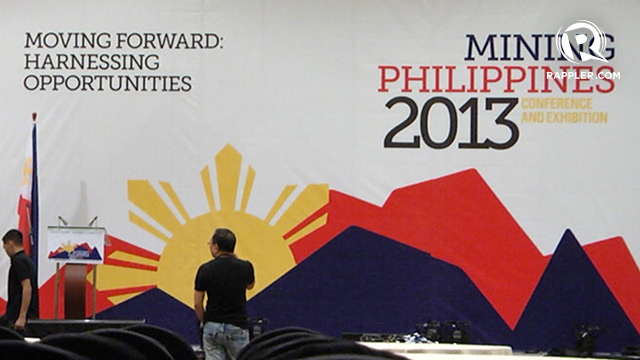SUMMARY
This is AI generated summarization, which may have errors. For context, always refer to the full article.

MANILA, Philippines – The country’s largest miners are urging the government to develop a single tax rate regime that will make the mining industry internationally competitive.
The current tax system must be “streamlined” into a single-rate, “progressive” and “equitable” structure that is easy to implement, said Justin Hillier, executive vice president of Sagittarius Mines Inc., as he presented the position of the Chamber of Mines of the Philippines in the 2013 Mining Philippines Conference Wednesday, September 11.
Hillier floated the idea as he warned any increase in current taxes will only make the mining industry less attractive than it already is.
“If we look at how much of the value of mining projects goes to government, it’s clear current fiscal regimes in the Philippines are not competitive,” he said. “The government takes more and in some scenarios, a lot more.”
Watch the video report below:
The Philippine government awards two types of mining contracts: the Mineral Production Sharing Agreement (MPSA) and the Financial or Technical Assistance Agreement (FTAA). MPSAs are for firms that are 60% locally and 40% foreign-owned, while FTAAs permit 100% foreign ownership.
While both are subject to 2% excise tax, MPSAs in mineral reservations pay additional 5% royalty. FTAAs are subject to 50-50 revenue-sharing.
Citing an IMF study, Hillier said the Philippine government gets approximately 60% share in mining projects in the country, higher than what the governments of other less developed countries like Chile, Peru and Indonesia get.
He said the government take was computed using the internationally accepted Average Effective Tax Rate, which takes into account not just earnings, but also cost of development, construction, operations and closure of a mining project.
“Increasing the rates will be bad for investments. Capital for mining projects globally is limited. If the returns here are poor, investors will go somewhere else.”
He said scrapping the MPSA and FTAA regimes and imposing a single-rate system is also more attractive for investors.
Scrapping incentives
Former Environment Secretary Horacio Ramos backs the position of the Chamber of Mines.
“There shouldn’t be an increase in taxes. Only the incentives have to be removed,” he said at the conference.
He called on the government to craft a fiscal regime that will consider the “risks and rewards” of the mining industry – and to craft it “fast.”
“Government must move fast. Since the issuance of EO 79, the Philippine mining industry has been at a standstill.”
Executive Order 79 banned the issuance of permits for new mining contracts pending the passage of a new revenue-sharing scheme between government and the industry.
The Mining Industry Coordinating Council is drafting a bill on the revenue measure for endorsement to Congress. – Rappler.com
Add a comment
How does this make you feel?




![[ANALYSIS] Trading irregularity in Abra Mining: Why the inaction?](https://www.rappler.com/tachyon/2024/03/tl-mining-trading-irregularities-03082024.jpg?resize=257%2C257&crop_strategy=attention)
There are no comments yet. Add your comment to start the conversation.